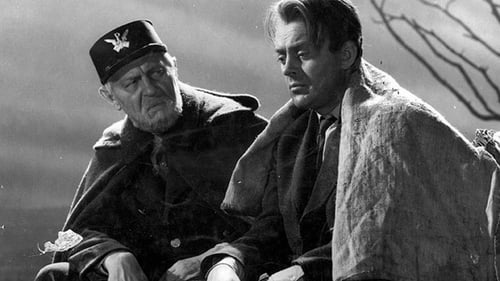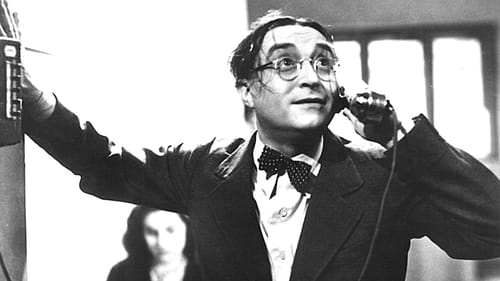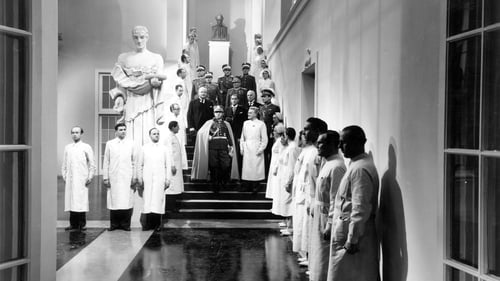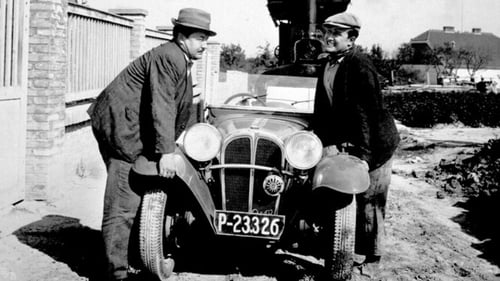
Bartos

The title of this highly-regarded Czech drama translates as Wolf Trap. Set in the 1920s, the story revolves around an ambitious young provincial politician (Miroslav Dolozai) who enters into a marriage of convenience with a smotheringly possessive -- and much older -- woman (Jirina Sejbavola). Hoping to temporarily escape his overbearing wife's clutches, the husband strikes up a friendship with her young ward (Jana Brejchova). The relationship blossoms into a deep abiding love, but the jellyfish husband can't bring himself to declare his ardor to the girl. Even after the death of the wife, the husband hasn't the intestinal fortitude to admit his passion, and the results are bleak indeed for the unfortunate ward. Director Jiri Weiss does a masterful job staging his story of frustration and denial against a backdrop of post-WWI bourgeois banality.

Vanek

Dog's Heads (Czech: Psohlavci) is a 1955 Czech drama film directed by Martin Frič, based on the novel of the same name by Alois Jirásek. It was entered into the 1955 Cannes Film Festival.

"The Rally" is based on a communist writer Vaclav Řezáč's well-written novel of the same name

Soviet delegate to the UN
Based on a true story

Hosek
A fiction piece centered around the Czech resistance to the Nazis.

Basada en la novela de Karel Capek, el destacado escritor checo de principios del siglo XX que acuñó la palabra robot para su obra R.U.R., la historia gira en torno al descubrimiento de Krakatit -un poderoso explosivo- por parte de Prokop, un científico experimental que, tras un explosión accidental en su laboratorio, entra y sale del delirio. Cuando se da cuenta de que, en un período delirante, le ha dado la fórmula para hacer Krakatit a uno de sus colegas, intenta encontrar al hombre, quien no se da cuenta de lo peligroso que es Krakatit. En el proceso, casi vuelve a revelar su descubrimiento a intereses extranjeros, a un grupo de anarquistas y a fuerzas de la oscuridad aún mayores...

Antonín Záruba
Five crime stories connected by the narration of police superintendent Bartosek.

Anton Bavor

Karel Valnoha / Konrad Peitel von Iglau

Ptáček
An ambitious and selfish lawyer confesses to the murder of his first wife. Some of the scenes were filmed in the last weeks of the war.

Commentary (voice)

Váňa

mydlář Antonín Aloyz

Jakub Krušný
Mist on the Moors examines fates of just about a few people. Their stories are outlined in a short space of time and are a symbolic representation of the drama of life, struggle for justice, human cognizance and the healing power of love. One of the most important components of the film is the nature, which ceases to be a mere stage for its plot—it serves almost as an autonomous plot agent. The movie landscape is a precisely defined and localized one. Only the South Bohemian ponds can serve as the right environment for development of such earthy and typically human stories as we encounter in the Mist on the Moors.

starosta Prouza

Barták

Matěj Řezáč

zřízenec

Járský

Kovanda

Reisenburský myslivec
"Grandmother" is a highly romanticized autobiographical novel by a Czech 19th century writer, Bozena Nemcova. It's a classical, compulsory reading in Czech schools, about a wise, working-class woman, happier in her simplicity and good heart than the nobles whom she serves.

farář
Ríša, a student of law, neglects his studies in favour of parties and pranks. His angry father refuses to continue helping him out of his debts. Ríša, however, is not entirely beyond hope. He decides to go and stay for a while with his uncle, a priest, who lives in Moravia, in order to prepare for his exams. He meets Helenka, the timid daughter of the local gamekeeper, at a village ball and is enchanted by her. The days pass and their idyllic relationship begins to tire Ríša. He begins to tell Helenka about his former debauched life the about the broken hearts of beautiful women. Helenka is hurt and refuses to see Ríša anymore. His uncle, the priest, is incensed at his behaviour and orders his nephew out of the house. Ríša tries desperately to find Helenka so he can make it up to her.

lékárník Janota

Dr. Klán

Commentary (voice)

MUDr. White
Venice Film Festival 1940

lékař
When Vilem appears in the road with an unconscious young woman, it disturbs the peaceful life of three generations of the Balvínova family.

profesor fyziky Rabiška
Small stories from a grammar school.Děj je poskládán z celé řady epizod, které během jednoho školního roku prožívají septimáni. Jejich pojítkem je příběh profesora přírodopisu Matulky, starého mládence a věčného suplenta, který si z přehnané svědomitosti ani v pokročilém věku netroufá složit tu poslední státnici. Stále se mu totiž zdá, že ještě něco nezná, a tak by snad bez diplomu odešel i do penze. Naštěstí jsou tu jeho studenti, kteří sice dávají dobráckému učiteli pěkně zabrat, ale po nezodpovědné klukovině s bouchacími kuličkami, kdy se Matulkovi udělá špatně, se kluci vzpamatují a s pomocí mladého profesora, někdejšího Matulkova žáka, připraví šlechetnou lest. Pod záminkou nákupu k doplnění školní entymologické sbírky je vylákán ke zkoušce u laskavého profesora Vondráka. (oficiální text distributora)

Josef Hupka
Venice Film Festival 1939

nezaměstnaný dělník Jindřich Benetka
Seventh form pupils at a grammar school in Přívlaky are preparing for a secondary school sports competition. Class creep Krhounek gives the class teacher Lejsal a copy of the seventh form’s magazine Roar. Most of the teachers insist on severe punishing the culprit. The author does not own up and consequently the whole class is punished by being banned from taking part in the schools competition. The most gifted pupil, Benetka, rather sharply criticises the school in a homework essay on a subject of his choice. The strict Czech language teacher is convinced Benetka is the author of the school magazine. Benetka denies the charge but his expulsion from school is proposed anyway on account the views he expounded in his essay. Eventually, Boukal, the author of the school magazine comes forward and admits to writing it. The pupils are allowed to take part in the contest and thanks to Benetka they win. In the meantime however the teachers vote to expell him.


A morally questionable lord comes to the aid of a working class man who is to be executed for speaking out about thieving rich scoundrels sticking it to the poor.

Staněk

Dr. Martin
The White Plague, a leprosy-like disease, ravages the world during a war. Based on a play by Karel Čapek.

František Douša

A student rebellion precedes revolutionary events in Prague.

Rudolf Res
The doomed love of a city girl caught in the vise of poverty is detailed in Vavra’s fluid, romantic work, one of the most elegant creations of the Czech Modernist era... The film lingers over its characters’ habitats and haunts, finding psychological truths in what each owns or desires, and countering every Hollywood-ready scene of gleaming restaurants and dazzling penthouses with realist moments of employment lines and crammed flats. Vavra’s classical camerawork and aura of romantic defeatism give Virginity a force comparable to the master of this genre, Hollywood’s Frank Borzage. (BAM/PFA)

Václav Šulc
Venice Film Festival 1937

Film about famous poet Karel Hynek Mácha

Antonín Hart
One of the few European films of the 30s to criticize the Nazis, even if they couldn't be directly named due to censorship: Gangsters with gray hats stir up trouble in what is obviously the Sudetenland.

Vejvoda

nový pohodný

MUDr. Jan Kosejk

Curious citizens await the arrival of an important guest, the son of poacher, who became famous abroad. Begins celebration in his honor, but nobody knows that instead of the hero arrived cursory prisoner number 1313. He quickly understand how things are and decides to take the opportunity and very quickly gets into a new role.

Eugen

A Milk-Cannery baron, Jakub Simonides, is broken by the Canned Milk-Trust and, in his wanderings with a worker, Filip Kornet, he discovers he still owns a half-finished apartment-house. They rally the workers and complete the building for use as a collectivist dairy. The cooperative flourishes and after a chase/pursuit with the police, pratfalls, slapstick and various crashes, the workers buy out the Milk-Trust.

Otakar Ševčík

A czech film that focuses on an unfaithful husband who married in to money, as well as an impoverished man who is turns to theft.















